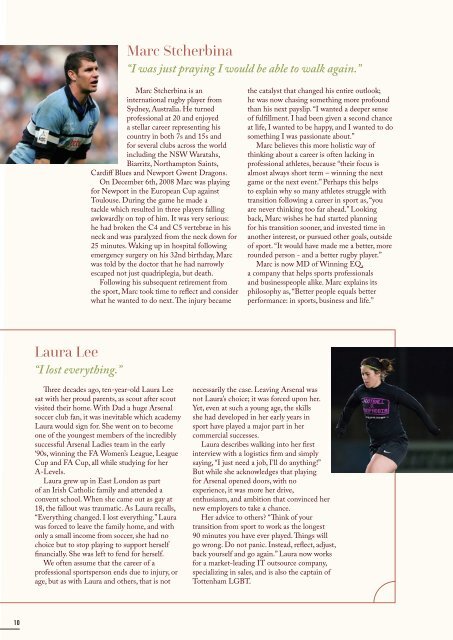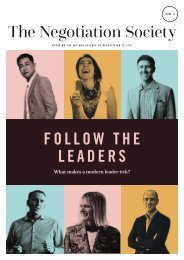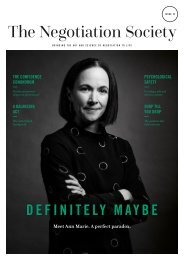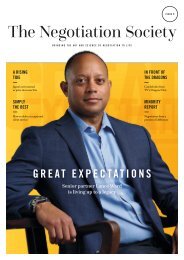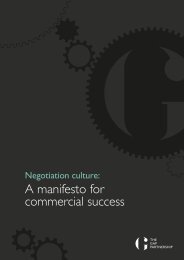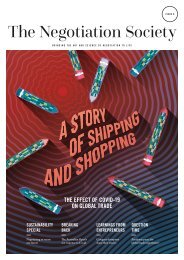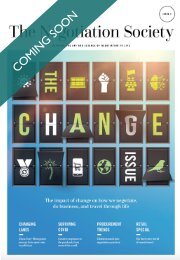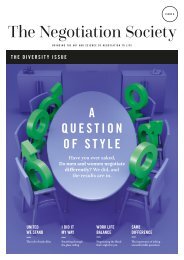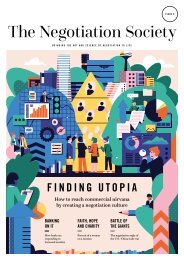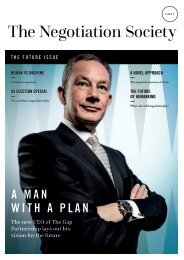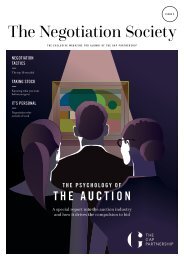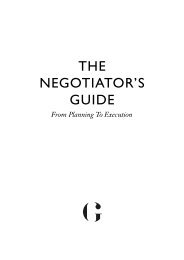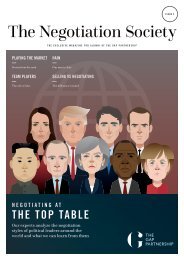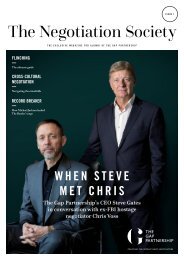The-Negotiation-Society-Magazine-The-Change-Issue
You also want an ePaper? Increase the reach of your titles
YUMPU automatically turns print PDFs into web optimized ePapers that Google loves.
Marc Stcherbina<br />
“I was just praying I would be able to walk again.”<br />
Marc Stcherbina is an<br />
international rugby player from<br />
Sydney, Australia. He turned<br />
professional at 20 and enjoyed<br />
a stellar career representing his<br />
country in both 7s and 15s and<br />
for several clubs across the world<br />
including the NSW Waratahs,<br />
Biarritz, Northampton Saints,<br />
Cardiff Blues and Newport Gwent Dragons.<br />
On December 6th, 2008 Marc was playing<br />
for Newport in the European Cup against<br />
Toulouse. During the game he made a<br />
tackle which resulted in three players falling<br />
awkwardly on top of him. It was very serious:<br />
he had broken the C4 and C5 vertebrae in his<br />
neck and was paralyzed from the neck down for<br />
25 minutes. Waking up in hospital following<br />
emergency surgery on his 32nd birthday, Marc<br />
was told by the doctor that he had narrowly<br />
escaped not just quadriplegia, but death.<br />
Following his subsequent retirement from<br />
the sport, Marc took time to reflect and consider<br />
what he wanted to do next. <strong>The</strong> injury became<br />
the catalyst that changed his entire outlook;<br />
he was now chasing something more profound<br />
than his next payslip. “I wanted a deeper sense<br />
of fulfillment. I had been given a second chance<br />
at life, I wanted to be happy, and I wanted to do<br />
something I was passionate about.”<br />
Marc believes this more holistic way of<br />
thinking about a career is often lacking in<br />
professional athletes, because “their focus is<br />
almost always short term – winning the next<br />
game or the next event.” Perhaps this helps<br />
to explain why so many athletes struggle with<br />
transition following a career in sport as, “you<br />
are never thinking too far ahead.” Looking<br />
back, Marc wishes he had started planning<br />
for his transition sooner, and invested time in<br />
another interest, or pursued other goals, outside<br />
of sport. “It would have made me a better, more<br />
rounded person - and a better rugby player.”<br />
Marc is now MD of Winning EQ,<br />
a company that helps sports professionals<br />
and businesspeople alike. Marc explains its<br />
philosophy as, “Better people equals better<br />
performance: in sports, business and life.”<br />
Laura Lee<br />
“I lost everything.”<br />
Three decades ago, ten-year-old Laura Lee<br />
sat with her proud parents, as scout after scout<br />
visited their home. With Dad a huge Arsenal<br />
soccer club fan, it was inevitable which academy<br />
Laura would sign for. She went on to become<br />
one of the youngest members of the incredibly<br />
successful Arsenal Ladies team in the early<br />
‘90s, winning the FA Women’s League, League<br />
Cup and FA Cup, all while studying for her<br />
A-Levels.<br />
Laura grew up in East London as part<br />
of an Irish Catholic family and attended a<br />
convent school. When she came out as gay at<br />
18, the fallout was traumatic. As Laura recalls,<br />
“Everything changed. I lost everything.” Laura<br />
was forced to leave the family home, and with<br />
only a small income from soccer, she had no<br />
choice but to stop playing to support herself<br />
financially. She was left to fend for herself.<br />
We often assume that the career of a<br />
professional sportsperson ends due to injury, or<br />
age, but as with Laura and others, that is not<br />
necessarily the case. Leaving Arsenal was<br />
not Laura’s choice; it was forced upon her.<br />
Yet, even at such a young age, the skills<br />
she had developed in her early years in<br />
sport have played a major part in her<br />
commercial successes.<br />
Laura describes walking into her first<br />
interview with a logistics firm and simply<br />
saying, “I just need a job, I'll do anything!”<br />
But while she acknowledges that playing<br />
for Arsenal opened doors, with no<br />
experience, it was more her drive,<br />
enthusiasm, and ambition that convinced her<br />
new employers to take a chance.<br />
Her advice to others? “Think of your<br />
transition from sport to work as the longest<br />
90 minutes you have ever played. Things will<br />
go wrong. Do not panic. Instead, reflect, adjust,<br />
back yourself and go again.” Laura now works<br />
for a market-leading IT outsource company,<br />
specializing in sales, and is also the captain of<br />
Tottenham LGBT.<br />
10


